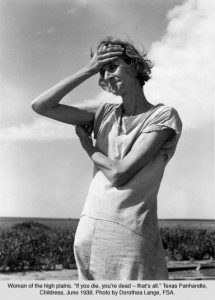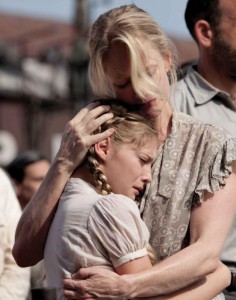Hunger Games
 No, this is not a still from The Hunger Games. Though she looks an awful lot like the mother of Katniss Everdeen, Nettie Featherstone (photographed here in 1938 by U.S. Farm Security Adminstration photographer Dorothea Lang) was among the many U.S. citizens who faced a daily struggle to feed herself and her family during the darkest days of the Great Depression.
No, this is not a still from The Hunger Games. Though she looks an awful lot like the mother of Katniss Everdeen, Nettie Featherstone (photographed here in 1938 by U.S. Farm Security Adminstration photographer Dorothea Lang) was among the many U.S. citizens who faced a daily struggle to feed herself and her family during the darkest days of the Great Depression.
While I admit to being well behind the curve in responding to Susan Collins’ wildly successful series of novels and the popular film adaptation, perhaps it is because as the father of an 11-year-old, the shocking brutality of the story (which by the way is far less brutal than the Japanese novel and film Battle Royale from which it borrows its central plot elements) required considerable time for reflection. Why would such a story be so popular among pre-teen readers and film goers, I wondered. Now that I’ve read the novel a few months after seeing the film it has finally hit me just how deeply the rhetoric of jobs at any cost to society and the environment filling the mediascape since the Great Recession of 2008-09 has infiltrated the imaginations of today’s young people.
Although at first I was somewhat disappointed in the filmmakers’ (including Collins, who co-wrote the screenplay) decision to omit the novel’s references to global environmental change as a background plot element, I’ve since decided that the costuming choices made for the film provide perhaps an even stronger (and more subtle) insight into the connections between our time in history and the socio-ecological struggles faced by earlier generations.
As I prepare to start another year teaching first-year college composition, which gives me the chance to work with students in every major, I am reminded that for the past several years my students have been increasingly fearful that a college education is providing them little more than preparation for our own version of the Hunger Games. Reading and viewing The Hunger Games has renewed my belief that cultivating a shared interest in environmental concerns offers us all a way to build a sustainable future through cooperation rather than competition and a way of breaking down the walls of fear and doubt that seem to separate urban from rural, liberal from conservative, person from person.

A friend passed along this video: “Hunger Games for Math Nerds” to help me consider how folks with different training might be looking at the film and book.
http://www.youtube.com/watch?v=b3cGpkJDcD8
Was reminded today that Ralph Ellison’s INVISIBLE MAN begins with a Battle Royale in which black teenagers are blindfolded and forced to pummel each other while a white woman parades around a boxing ring naked with an American flag painted on her body. Would love to hear about more Battle Royale’s that influenced THE HUNGER GAMES from anyone with info.